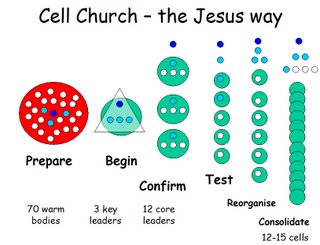Tuesday, April 25, 2006
Loving the Lost
Our church (St.Mark’s) is about 100 members. At the 86:1 rate after 15 years we would have 119 members assuming noone died or left. At the 3:1 rate of new members after 15 years we would have nearly 7,500 members in 15 years.
Guy gives some clues as to why the Ecuadorian believers are so fruitful. We have much to learn :
1)Praying daily for lost. Talk to any of the believers in a Guayaquil house church and they will show you their list of people they pray for daily of unsaved family, friends, neighbors.
2) Active regular sharing of the Gospel. It is a very natural part of their Christian walk to share the Gospel with people they encounter in their daily lives. Christ has made such a difference in their lives, and they cannot help but share this with those they come in contact with.
3) Planning regular evangelistic events. The house churches plan regular evangelistic events inviting those they are praying for to attend (concerts, outdoor street meetings, special programs, family conferences, DVD/Videos, invited guest speakers, neighborhood evangelistic door-to-door blitzes, etc.)
4) Visiting the sick and personally ministering to lost friends, neighbors and family in times of crisis. They are very good about visiting sick people outside of their church family, praying for their healing and ministering to lost family and friends during difficult times.
5) Not distracted by a lot of outside issues like Thom Rainer mentions above. We too have our sticky issues, but they are more along the lines of things like can unmarried couples who get saved be baptized? How to counsel people with difficult problems? How to discern if someone is demon possessed or just emotionally unstable? How to handle questions that Roman Catholics always ask? Why doesn't God always heal someone when they are prayed for? If I were to share with them (and I don't) the issues that are causing all the uproar in the IMB and SBC these days, they would shake their heads in disbelief!
6) Intentionally focus on evangelism as a life priority. Talk to any of them and they will tell you that their ministry is to win/disciple at least eight people this year. They expect God to give them these souls and are consciously praying and working to achieve this goal.
7) They maintain friendships/relationships with lost friends, neighbors, co-workers, etc. They play ball on the street with them, visit them in their homes, minister to them in times of need. How are we ever supposed to win people to the Lord if we have little/no relationship with the lost? How is a Christian supposed to win lost people if they do not even know any? Folks here know plenty of lost people whom they are burdened for their salvation.
Wednesday, April 19, 2006
Lessons learned in the UK
I just found an essay by Laurence Singlehurst which discusses some of the lessons learned from 10 years of doing cell church in the UK. We are not the only church to have found it difficult to develop an outward focus. Here is an extract:
So what have we learned? We have learned that this is much harder to do in practice than theory. That many people are very caught up in their relationship with God and their community with other Christians, and it is a challenge for everyone to become outward-focussed. For a church to become outward-focussed, where it is the norm for people to be in relationships, and these relationships to be carriers of Christian love, light and truth, is a two to five year process and could take longer. We have learned that still revival fantasy is locked up in our souls, that our idea of evangelism is that God will do everything and we have to do nothing, or surely to goodness, this is the leader’s and evangelist’s responsibility. For this to become the passion and responsibility for every church member is a necessary but difficult journey. It is easy for cell groups to revert to fellowship groups, and by this, I mean they have two strands of the Great Commandment and the Great Commission: they’ve become places where people exercise their love for God and love for one another through Bible study and fellowship, but the outward focus drifts away.In another part of the document Laurence discusses the problem of discipleship
However, we have also learned that the honesty that is required to make these small groups work, because discipleship issues have to do with life and not just ideas, and that means there has to be a measure of honesty as people share the problems they face in their lives as it relates to discipleship, and the group then prays; hopefully the Holy Spirit is at work, and the group supports one another as we all go through our life-changing experiences. So whereas the idea of facilitation is in the culture, the ideas of behind honesty and vulnerability are not. So this is a challenge and it is easy for groups to settle at a theoretical level. Again we see the importance of coaches who visit groups on a regular basis, and well-trained cell leaders who are able to model honesty and vulnerability so that it becomes a part of the life of the group.In another place he looks at the difficulty of mobilizing every member into ministry:
... it is very difficult at times for leaders to learn how to be a leader, but their leadership changes inasmuch as they are not doing things themselves, but are facilitating and inspiring others to do it, which, in the short term is always much more work, but in the long-term is extraordinarily rewarding.. We have seen churches which have sought to go on the journey of cell, but when they have seen the implications of going to cell, and the spiritual anarchy that this can produce, as many are inspired to do their own vision and own ministry, many will do things that perhaps in the past, church leaders might not have thought were as worthwhile as what they had in mind. This can be frustrating, until you learn that mobilisation has a benefit. That church leaders can still put vision on the table just like everybody else, and the church can hear the Holy Spirit speaking to them as a group, agree that this is the direction, and because of mobilisation, you will always have a percentage who want to put their energy into that particular vision, so you can have your cake and eat it, as there is enough manpower to go around. But this is a journey to go on.The most powerful section for me was this analysis of why it is so difficult to get people to do what they are capable of doing:
Thirdly, mobilisation is hampered through what is a major discipleship issue. That is the appalling low self-image that many British people seem to have. While at work, or in other spheres in our life, there are constraints and pressures that force us to live beyond our self-image, church is a voluntary organisation, and we can just fall back to our underlying self, our underlying view and listen to the negativity that is in our souls, and hence to nothing. So we must continue to disciple people in a high view of themselves, so that they can do what God has caused them to do.
Fourthly, mobilisation is hampered by a benefit-based culture. There is a sense that in the 80s and 90s, people were won into church on a be-blessed mandate; be healed, be whole. Yet now, we are seeking to challenge them to be a blessing, to work hard, to reach out. We are seeking to create a different culture, and if we are honest, within every Christian soul, there is a swerve to rot, that says ‘I would like to be blessed. I’m not sure I want to be a blessing. It’s too much. I can’t work.’ So the cell church faces, as everybody does, the leftovers of our benefit-based consumerist influence, which is in the life of our churches.
Click on the link to read the full article:
http://www.celluk.org.uk/documents/ImagineEssayLICC-LessonsfromCell.doc
Tuesday, April 18, 2006
There is no baking powder in the Kingdom of God
I often hear God most clearly in my waking thoughts. Maybe this is what people in the bible meant when they report that God spoke to them through a dream.
This morning, as clear as a bell I knew that we need to run a “prototype” cell with a few people who really have the vision and values of the Kingdom of God. This little group of radicals will work out how to do nothing except what the Father tells us to do (John 5). We will seek first the Kingdom of God and not worry about the church buildings or be distracted by the church’s internal squabbles.
When we feel confident that we know what it feels like to be dead to self and alive to Christ we will invite a few others to join us and become two or three cells. In the new cells disciple making will take place. The new members will also need to discover what it feels like to be totally 100% dedicated to following Jesus. If we don’t get this we will never see multiplication. There are no passengers in the Kingdom of God.
The Kingdom of God is like the yeast working its way through the dough. It starts small. At first it is slow. At the second and third stages it will be slow. But if the DNA is right it will multiply. There is no instant way to leaven the lump. There is no baking powder in the Kingdom of God.
Values are caught, not taught.
About 3 years ago I tried retraining all my cell leaders. We closed down the cell groups. We held meetings all together in the church building for about 6 weeks to go over the values together. We called this “Shining Brighter” and it was attended by about 35 people. I was a bit disappointed at the time that some of the potential cell leaders did not attend. In the Autumn while the cells were not running I led two cell groups, each with 10 members. We worked our way through the Cell Leader Training booklet produced by Cell UK.
By Christmas when we finished the training I was not convinced that we had the values, so I kept the two groups going and between Christmas and Easter we went through the “Breakthrough Course” which is based on Neil Anderson’s Breaking Through to Freedom in Christ. The idea of this was that it could be used for disciple making as it teaches things like: how to believe the truth; how to forgive; how to resist temptation; how to deal with anger etc.
Easter arrived and we re-launched the cell groups. But I knew even then that we were not ready. I knew that we did not really have the values fully embedded. So here we are two years later. The cells have mutated. We have not multiplied.
So why did the retraining not work?
This is not well thought through, but here goes:
1) The groups were a bit too large and so interaction was limited
2) Some people were present because they felt obliged to be there because the vicar said so
3) We were more focussed on the content of the training than developing genuine community
4) Because the group was expected to last for just 10 weeks some folk only saw it as a meeting and did not do the work necessary to become a community
5) I was also running an Alpha course on another evening of the week and preaching etc etc
6) As cell leader of two large cells I did not do a good job of pastoring the members in between meetings.
7) I did not have an assistant since everyone in the two cells were going to be either a leader or an assistant.
8) I did not spot the failure of the groups to form genuine community until too late
9) I became depressed when I realised the re-training was not working and that we were going to re-launch cells without the values fully embedded
10) Bill Beckham said “never try to change a structure until you have changed the value” but I was too impatient. He was right. And that, dear friends, is why we are still in The Big Red Circle. But soon, I am not sure quite when, I will be looking for recruits from within The Big Red Circle to join the prototype cell. Maybe this time we will get it.
Thursday, April 06, 2006
Various Hats

I am conscious that I am wearing a variety of hats.
As a vicar in the Church of England I feel a bit like an officer on board the Titanic who has realised that the boat is going to sink, even though the passengers are still having a wonderful time and many of the senior officers are in denial.
 As a member of the New Wine Network and I am part of a group of happy cowboys who are bucking the trend of decline and proving that “come-to-us” churches can still attract some of the people. The key to this is (probably) having a generous
As a member of the New Wine Network and I am part of a group of happy cowboys who are bucking the trend of decline and proving that “come-to-us” churches can still attract some of the people. The key to this is (probably) having a generous  heart that enables us to bless those who are not yet part of us.
heart that enables us to bless those who are not yet part of us.As Chair of the Greater Manchester Cell Forum I am part of a group of evangelistic baby-boomers who believe that a radical restructuring of the Church is needed. We are already seeing some of the benefits of this restructuring, but we have not yet broken through into significant multiplication. As a self-reflective aside, we are a curious bunch who are post-modern at heart, but very modern in our belief that we can adapt a model and make it work here. Alan Roxburgh describes us as “Liminals” in his new book, The Sky is Falling (recommended by Todd Hunter).

Finally, in my racoon-skin pioneering hat I am standing on the brink of a brave new world. I hear the call to call together a team of church planters who will go to the gentiles with the message of the Kingdom. Is this just because I read Wild at Heart by John Eldredge? I don’t think so. I am being called out.
Wednesday, April 05, 2006
Still in the Big Red Circle
Some years ago I heard Bill Beckham talking about the way Jesus prepared his disciples before they became the Church. He gathered about 70 who really understood the message of the Kingdom and sent them out in pairs to the towns and villages of Israel. Within the 70 were the 12 and the inner core were Peter, James and John. Bill described these 70 as being the critical mass within a big red circle around Jesus.
Bill suggested a way of starting cell church with the leader discipling first the inner core, then working with the 12, then testing if they have "got it" with the 70. Eventually, when the DNA is well established the church will start to multiply.
At St. Mark's we are still in the big red circle. Our cell groups do not yet have the full DNA needed to replicate. Many of our members have never really been discipled and so they do not yet know how to make disciples. We have about 35 "warm bodies" (to use Bill's terminology) and various "lukewarm bodies". We have not yet reached the critical mass necessary for expansion.

